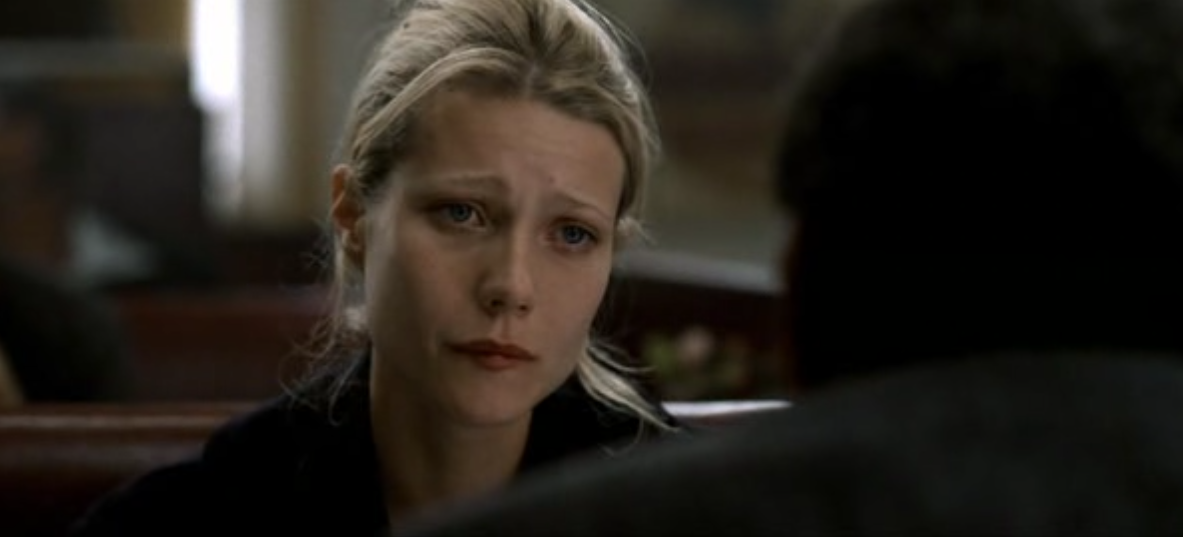by Jason Adams

The glimmers of hope that shine through the dank squalor of David Fincher's serial-killer masterpiece Se7en, which is turning 25 today, are so few and far between that we find ourselves clinging to them like life-rafts bobbing down a turbulent sewage drain. One of the library's security guards says, "We got culture coming out of our ass," and then they do, as the gentle strings of Johann Sebastian Bach's "Air Suite No. 3 In D Major" fill the golden-hued dungeon where Detective William Somerset (Morgan Freeman) does his dark research. Similarly Brad Pitt's Detective Mills finds some peace at home playing with his beautiful lively puppies, all locked into a small room lined with newspapers where the dogs do their own important business. Happiness looks like it smells bad!
This nameless city is torrential rain and moldy wallpaper most of the time -- when it's not simply carved-up bodies rising to the surface -- and so Gwyneth Paltrow, ever-chic and resolutely blonde as sunshine, she stands out the first second we see her, coming as she does nuzzled up against Brad Pitt's wall of themselves golden abs. Now this, this right here... is the magazine ad picture of desirable domesticity -- the dream that four years later in Fight Club Fincher would satirize so memorably... although it didn't take him that long, given our postcard pretty couple's fate right here. Like Psycho's shower and the beach in Jaws nobody would ever quite look at a cardboard box the same way again post-Se7en.

We see far less of Tracy, Paltrow's character, in the film than I recalled, and my recollection must have faltered precisely because Paltrow manages to make such an impression in her two big scenes -- early in the film she invites Somerset over for a home-cooked dinner at their mid-unpacking apartment (do note how it's filled with, gasp, cardboard boxes). And not long after Tracy calls Somerset up out of the blue for advice, and the two have a cup of coffee at a greasy spoon straight out of central casting. Every space in this city as Fincher paints it is a familiar set gone to seed, just more of it, as if these places have been automaton running since the 1920s, the dishes and dinge piling higher by the day... whatever a day means in this world with no sun. There's no exit from this grinding, awful machinery.
The contrast between Tracy as we see her in that dinner scene and when we see her next, at that diner, is at first stark. The majority of Se7en is supposed to take place over the span of a single week -- "Seven days, Seven sins," you can practically hear the mad-faced carnival barker barking -- and yet between these two moments, seemingly only a couple of days apart, she's half dissolved before our eyes. On a first viewing you get the sense that it's the city's rattling her, with the subway trains literally rattling their walls every twenty minutes, but on multiple views you can see Paltrow connecting the dots between these two different faces from the start and it seems to be of her person, not just this place.
Tracy is already lost in her thoughts the minute we meet her, missing half of Somerset's houseguest questions, off cued. And across that dinner scene we can see the woman's focus pull tighter, calmer, as she realizes under that gruff exterior Somerset is actually a decent and good man. A man she can talk to and trust. Tracy has her own world of secrets piling up, just off camera -- Paltrow makes her relief in the presence of decency so colossal and hungry that we can't help but take notice. This is a drowning woman in desperate need of a drink. She latches on to Somerset like salt-less gallons in the sea.

Of course in the grand tradition of these movies the forgotten wife must play our tragedy, and Tracy must become the devastating consequences of this place and her husband's blind decisions -- she is another victim, more golden gasoline for a man's righteous vengeance. And yet Paltrow's performance, small as it is, always digs around for me into some deeper spaces -- in her limited screen-time Paltrow somehow manages to make the chess-move horror of Tracy's end entirely about Tracy. We never even see the infamous head in the box and yet in the face of these men's clever and horrible games with one another, so loud against the finally summoned orange-toxic sunlight, I forever feel the devastating weight of all that's missing with Tracy, the person not the pawn, suddenly tipped over on the board.